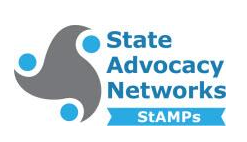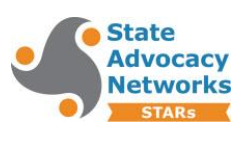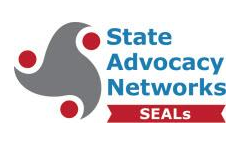Events and Resources
Advocacy Tips for Calling Your State Legislators
To find your state legislator’s phone number, you may use our searchable online directory or call your state’s switchboard at and ask for your Senator and/ or Representative’s office. When you call, if you speak with someone other than your legislator, take down their name and title. Upon reaching your state legislator on the phone, it’s easiest to follow these four basic steps:
- IDENTIFY yourself by name and the organization (if any) that you represent or the town from which you are calling.
- EXPLAIN why you are calling: “I am calling to support/oppose House Bill: HB ##, Senate Bill: SB## “. Be polite and concise. Creating 1 or 2 talking points will focus the content of your message. Too much information may confuse your message. Ask your legislator his/her position on this issue. Don’t assume that your legislator has prior knowledge of your issue. Be calm, respectful, and be prepared to educate, using local examples to accentuate your point.
- REQUEST a written response to your phone call if you did not speak to your legislative member. If the legislator requires further information, provide it as soon as possible.
- THANK the person who took the phone call for their time and consideration.
Find Your New Jersey Legislator
Find Your United States Senator
United States Senate
United States Representatives
New Jersey Legislative Information
How a Bill Becomes a Law
How a New Jersey Bill Becomes a Law Student Guide
New Jersey Legislative Information and Bill Room
New Jersey Lawmaking Process
New Jersey State Licensure Information
Aud/SLP NJ State Licensing Board/Advocacy Committee Information
Audiology and Speech-Language Pathology Advisory Committee – Meeting Dates, Agendas and Minutes
ASHA’s New Jersey State Advocate for Medical Policy (STAMPs)
ASHA’s New Jersey State Advocate for Reimbursement (STARs)


Sarah Warren, director, Health Care Policy Medicare for ASHA, indicated that there should be a Congressional Update in July. There should be information regarding the Peace Schedule Rule, Audiology Provisions: Audiology Access/Coding, Remote Therapeutic Monitoring Codes, Reimbursement Reductions and Telehealth.
ASHA is focused on four major areas that will come out in July: Fees Schedule Rule, Home Health Rule, Outpatient Hospital Department Rule and Skilled Nursing Facility (SNF) Nursing Minimum Staffing Rule.
ASHA introduced the Permanent Telehealth to Legislation in June. The Audiology Bill was reintroduced to Senator Elizabeth Warren and Rand Paul to ensure better access to hearing health care services.
Centers for Medicare/Medicaid (CMS) continue to state that they do not have “legal authority” to cover telehealth services in facilities: this impacts hospital outpatient departments, SNF and rehabilitation agencies. Members of Congress backed ASHA to indicate CMS does have this ability through the Consolidated Appropriations
ASHA’s New Jersey State Education Advocacy Leader (SEAL)

By Melissa Eldred, MS, CCC-SLP, New Jersey SEAL
According to the National Coalition on Personnel Shortages in Special Education and Related Services (NCPSSERS), 14 percent of public-school students nation-wide receive special education services, with one out of five having a speech and language disorder. NCPSSERS has worked together with more than 30 member organizations, including the American Speech-Language-Hearing Association (ASHA) to identify/propose solutions and advocate for changes that address the persistent shortages in special education since 2006. However, shortages persist with educators, not only leaving the profession, but also dissuading others from even entering the profession. According to ASHA’s 2022 School’s Survey Summary, the top five challenges that impact speech-language pathologists (SLPs) include a large amount of paperwork, high workload/caseload size, number of meetings, limited time for collaboration and limited understanding of the SLP’s role by others.
While there are legitimate shortages across the country, New Jersey does not appear to have an actual shortage of speech-language specialists (SLS), based upon a recent survey conducted by the New Jersey Speech-Language-Hearing Association (NJSHA). It is suspected that “shortages” in New Jersey schools may be related to how positions are advertised, since each district advertises openings on its own website making it necessary for job seekers to view multiple sites to identify open positions. SLSs have voiced their struggles finding available positions as district employees, though according to many reports to NJSHA, job-seekers are barraged with private companies looking to fill school-based positions and sometimes told by a district to contact a specific company (*Privatization is an ongoing issue that is increasingly impacting SLPs/SLSs in New Jersey though it is beyond the purview of this current report. For more information about privatization, please visit www.njsha.org and log in to the Member Center and click on Committee Resources, then click on School Affairs Resources and read Privatization and the School Based SLP under Back to School Topics for SLSs).
Regardless, SLSs in New Jersey, along with all specialized instructional support personnel (SISP) across the country, continue to struggle with similar challenges of high caseloads/workloads, paperwork, etc. Recruitment and retention are critical. Representatives from ASHA suggested during a SEAL teleconference that the state departments of education and individual districts need to provide educators with access to appropriate professional development, financial incentives to support personnel, allow collaboration among professionals in order to feel supported and provide recognition and advancement opportunities.
Advocacy is necessary to make changes that can improve the situation. But what can one individual do? One of the easiest ways is to maintain NJSHA membership. The money from our NJSHA membership dues goes to providing affordable continuing education, advocacy efforts that monitor and advocate on our behalf regarding critical issues, providing resources that support your ability to follow state-specific regulations, providing opportunities to connect and collaborate with colleagues and so much more. Without state associations like NJSHA, none of this could be possible. Your membership is essential! Get connected. Stay engaged. Email me for more ways that you can make a difference at info@njsha.org.
Student Advocacy Day 2024
Each year, lobbyists from Porzio Governmental Affairs with the support of NJSHA’s Higher Education and Student Involvement committees conduct a Student Advocacy Day for students in Audiology and Speech Language Pathology Programs at universities across New Jersey. They work to educate the students on the Legislative Process and bring students to the Statehouse in Trenton to observe committee hearings, have meetings with Legislators and learn the “ins-and-outs” of lobbying. Students learn about NJSHA’s current legislative priorities like the ones listed on this page, and discuss strategies to engage in the legislative process and become effective advocates for policy changes that will impact their professions and the patients/clients they serve.

NJSHA 2023 Survey Findings
NJSHA surveyed speech-language pathologists across New Jersey to identify trends related to the perceived shortage of SLPs in New Jersey as well as identify trends in hiring, and work satisfaction. This information was also gathered to identify potential issues that NJSHA can address. The following PowerPoint presentation can be reviewed here to obtain the results from the 1,197 respondents to this survey.
